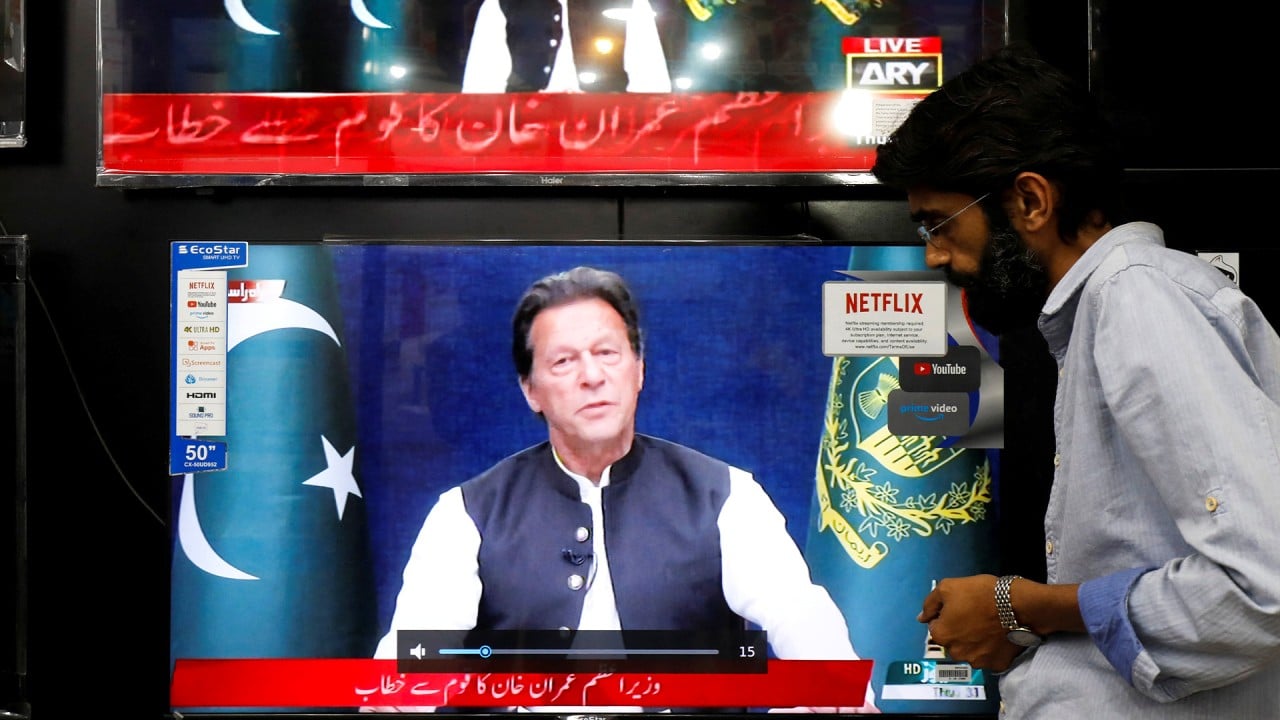
Imran Khan vows to fight on after Pakistan Supreme Court rules against plan to scrap election and no-confidence vote looms
- Moves to keep the besieged leader in power by dissolving parliament and calling early elections were declared illegal in a unanimous decision
- Khan vowed to keep fighting, saying he had called a cabinet meeting and would address the nation on Friday. The no-confidence vote will take place on Saturday
Pakistan’s Supreme Court overturned Prime Minister Imran Khan’s move to hold an election and reinstated the national assembly four days after he dismissed it, bringing the embattled leader one step closer to being removed from office.
A five-member bench headed by Chief Justice Umar Ata Bandial unanimously outlawed the cancellation of no-confidence vote against Khan, who was certain to lose by a substantial margin. The vote will now take place on Saturday.
Pakistan chaos grows amid debt woes, China concerns over CPEC projects
The court also reinstated Khan as full-fledged prime minister and his cabinet with immediate effect so as to end the power vacuum created by the dissolution of the national assembly.
Khan vowed to keep fighting, and said he would address the nation on Friday and would “continue to fight for [Pakistan] until the last ball”. He said he had also called for a cabinet meeting.
The political instability risks delaying the release of a loan installment from the International Monetary Fund. A sliding rupee, surging inflation, and falling foreign-currency reserves forced the central bank to surprise markets earlier Thursday with the biggest interest rate increase since 1996.
The Dawn newspaper welcomed the Supreme Court ruling, saying the court had reasserted itself as the custodian of the constitution.
“It is hoped that the verdict, delivered just as matters seemed to be hurtling towards chaos, will be able to pull the country back from the precipice,” the English-language newspaper said.
Khan said last week that he was the target of a purported US-led conspiracy. Citing the prime minister’s claim, deputy speaker of the national assembly Qasim Suri declared the opposition MPs as traitors, according to his convoluted interpretation of the constitution, and summarily prorogued the parliamentary session.
Minutes later, President Arif Alvi dissolved the national assembly on the prime minister’s recommendation and ordered a general election to be held within 90 days.
Alvi, Suri and the speaker of the national assembly are all PTI politicians and close confidantes of Khan.
The president asked Khan to continue as prime minister until a caretaker administration could be formed. This in effect enabled Khan to retain control of the federal government.
What Pakistan’s political turmoil means for neighbours like China, India
But the Supreme Court ruled that Suri’s order was illegal. Under Pakistan’s constitution, a vote of no-confidence cannot be obstructed on any pretext. Nor can the assembly be dissolved once a no-confidence motion has been moved by the opposition.
The court’s ruling is seen as a victory for Shahbaz Sharif, president of the Pakistan Muslim League-Nawaz (PML-N), who is likely to become the next prime minister if Khan is ousted.
Sharif welcomed the Supreme Court’s judgment as “epoch-making”.
“Today, politics of lies, deceit and allegations has been buried. The people of Pakistan have won,” he said on Twitter.
Sharif has been nominated by a broad-based coalition including the Pakistan People’s Party (PPP) of ex-president Asif Zardari and 10 other disparate regional and religious parties.
The PPP and PML-N were bitter rivals for decades until Khan’s Pakistan Tehreek-e-Insaf (PTI) emerged to challenge their dominance.
Pakistan PM Khan’s coalition partner jumps ship ahead of no-confidence vote
The case has shone a harsh spotlight on dubious past judgments by the Supreme Court.
The court unseated Khan’s predecessor Nawaz Sharif in 2017 and sitting prime minister Yusuf Raza Gilani in 2012 on flimsy legal grounds.
The Supreme Court has an equally checkered history of relying on dubious legal doctrines to provide constitutional cover to military dictatorships.
The most notorious, known as the “doctrine of necessity”, essentially legalised coups as fait accompli.

Chief Justice Bandial was under intense public scrutiny throughout the four days of hearings.
He courted controversy by cherry-picking the four other members of bench formed to hear the case, instead of appointing the seniormost judges as is customary with cases of national importance.
A group of 100 influential academics and other members of Pakistani civil society on Wednesday wrote an open letter to the chief justice demanding that the Supreme Court “bury the doctrine of necessity” by outlawing deputy speaker Suri’s ruling.
Russia trip, Chinese ties work against Pakistan’s Khan as ouster calls grow
Having ruled Pakistan directly and indirectly for most of its history, the military was also watched closely for signs that it might intervene to end the country’s constitutional crisis.
The military’s public relations wing repeatedly said the generals wanted no part in the power struggle between Khan and the opposition.
“These days, the army prefers to be influential from behind the scenes rather than holding power directly,” said Michael Kugelman, deputy director of the Asia centre at the Wilson Centre, a Washington think tank.
“But it can certainly play the role of kingmaker backstage.”
Additional reporting by Reuters and Bloomberg


